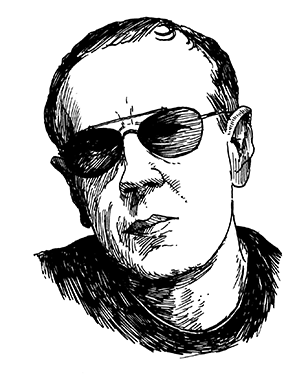Scott Walker, a.k.a. Noel Scott Engel, may be pop music’s most frustratingly elusive icon—the Thomas Pynchon of the ’60s singer-songwriter generation—whose marked absence from public conversation for nearly a decade at a time serves only to reignite fiery devotion and speculation among fans and critics when the latest record descends. Like Pynchon’s, Walker’s meritorious star appeared to burn brightly in the late ’60s, when, as the velvet baritone of the Walker Brothers trio, Scott earned adulation as the existential voice of London’s foppish counterculture. In fact, Walker had been releasing records and touring since he was thirteen, having spent his youth cutting class, watching foreign films, and playing clubs along the Sunset Strip in Los Angeles, where he was first discovered, by teen idol Eddie Fisher.
In the late ’60s, Walker released four solo albums—Scott 1 through 4—an epic, European Götterdämmerung of brooding, off-kilter pop. Produced for Philips Records with extraordinary efficiency between autumn 1967 and late 1969, the Scott albums laid out a vast panoply of influences, from classical composer Jean Sibelius to Flemish chanteur Jacques Brel to French Algerian author Albert Camus and Swedish filmmaker Ingmar Bergman. Delivered with Walker’s trademark ululations, the songs evoked a baroque sound-world of diseased soldiers, bloodthirsty dictators, daydreaming psychotics, and bored housewives.
Skip ahead to the late ’70s and early ’80s, when, after a string of failed cover albums and a preempted Walker Brothers reunion, Scott released a pair of futurist gems, Nite Flights (a Walker Brothers album sliced into three solo efforts) and Climate of Hunter. Part Brian Eno, part Joy Division, Scott’s new sonic palette might sound thoroughly dated to the modern-rock ear, but it portended a major shift in the former crooner’s creative direction. However brilliant was the reinvigorated Scott Walker, the albums sank quickly into anonymity, as did the artist behind them.
Further efforts at recording would not materialize for another decade, with 1995’s dark, operatic masterpiece, Tilt. Many critics hailed it as the best comeback of the decade, though Walker reappeared only in glimpses, perpetually hidden beneath a baseball cap and refusing most interviews or on-camera appearances. Another ten years elapsed until the appearance of 2006’s The Drift, a terrifying Grand Guignol unlike anything else in contemporary music—a consummate reexamination of Walker’s own musical history. A brief appearance in Stephen Kijak’s 2006 Walker biopic, 30 Century Man (whose cast of fans included Brian Eno, David Bowie, Jarvis Cocker, Johnny Marr, and Damon Albarn), signaled Scott’s intentions of developing a more public persona, although tentatively and very much on his own terms.
After two years in the organizing, this interview finally occurred with...
You have reached your article limit
Sign up for a digital subscription and continue reading all new issues, plus our entire archives, for just $1.50/month.
Already a subscriber? Sign in





